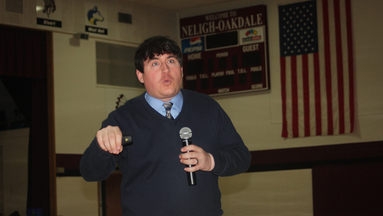 Class IV Felony. If students took one thing from today's Digital Citizenship assembly, it was the seriousness involved with receiving - not just creating or sending - inappropriate messages. Bobby Truhe, an attorney with KSB School Law, spent an hour at both Neligh-Oakdale and Clearwater-Orchard today detailing to students grades 6-12 and many parents the seriousness of online activity from cyber bullying to sexting. When asked about specific area cases, Truhe told the students inappropriate digital use is all around, including locally. That's why, he said, they need to know what the consequences are to keep from making those mistakes. Watch the video of the full assembly "The worst classification you can have for crimes in a felony, and if you are sexting under 19 years old and get caught, it is a Class IV felony," he said, making the students repeat that consequence numerous times. "If you are 17 years and you take nude picture of yourself and you send it to somebody, you have created what we call child pornography. It doesn't matter if this phone is just of you. If you send it to somebody, you can be charged with a crime." Truhe cited examples from various parts of the country, as well as in Nebraska, of teenagers being prosecuted for crimes involving social media. From apps that students think are anonymous - Yik Yak, SnapChat, etc - to suicides following cyber bullying, Truhe detailed the arrests made, sentences handed down, bankruptcies filed by families and other consequences. Police, Truhe said, can get the location of a terroristic threat from Twitters and other apps in a matter of minutes. All photos and videos created on SnapChat are saved, so there really is no anonymity. Truhe also spoke of many cases in Nebraska of middle-aged men pretending to be teenage boys on social sites. Luckily, the cases he detailed all had happy endings of the perpetrator being caught by police before abducting the teenage girls. As for the excuses judges hear in court, which Truhe said typically are "I was just joking," he said don't matter. Teenagers are considered smarter than their parents with technology and are being held to the standards of adults and are prosecuted in that matter. Truhe told students if there's any doubt about what they're putting online, consider "The Grandma Rule." "If you wouldn't say it to your grandma, don't say it. If you wouldn't send it to your grandma, don't send it," he said. "Who here would send a dirty picture to your grandma. No, right? Sick." |
|
News That Matters To Antelope County - Your News. Your Way. Every Day!
© Pitzer Digital, LLC










 RSS Feed
RSS Feed


